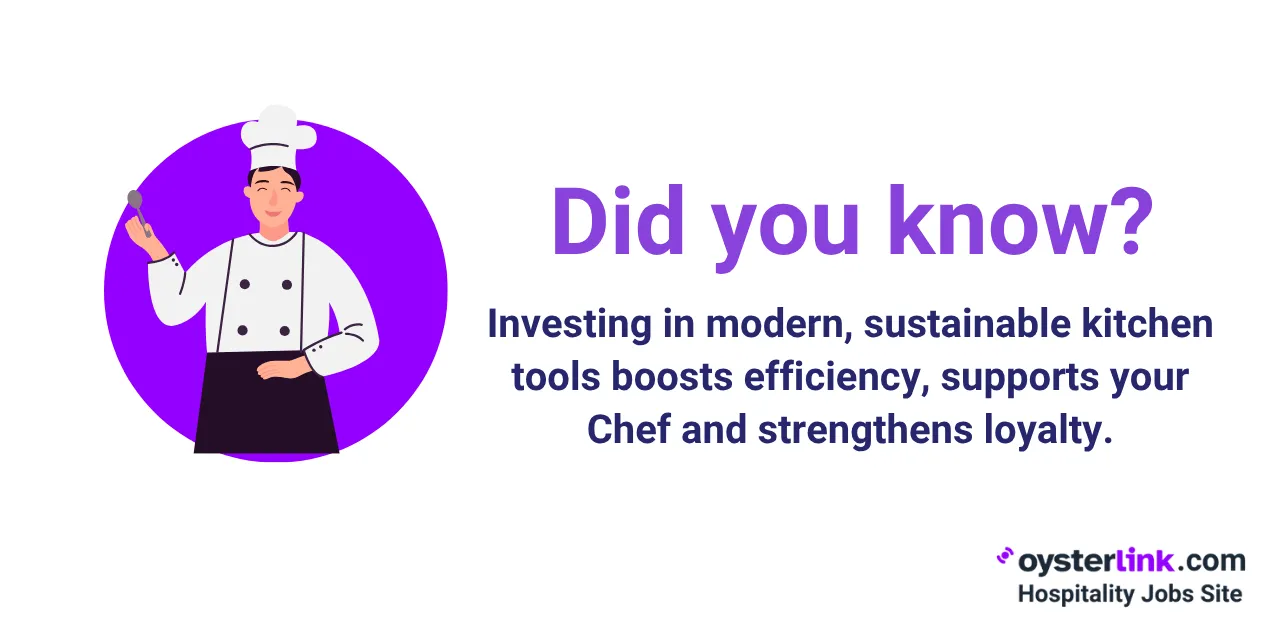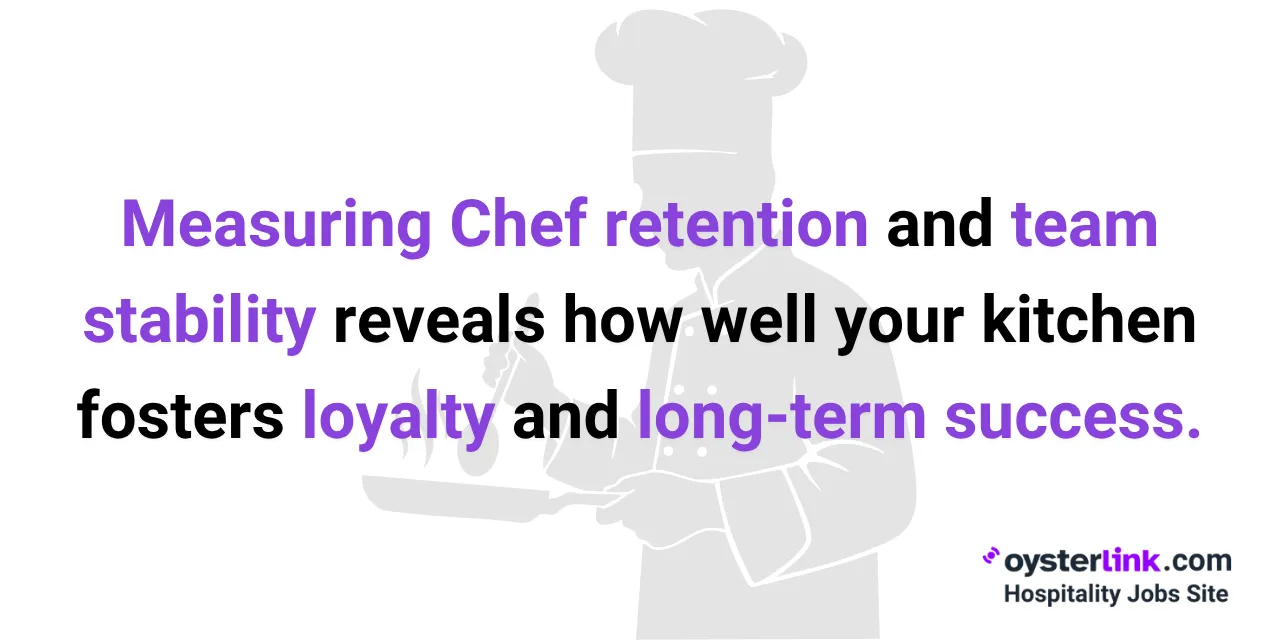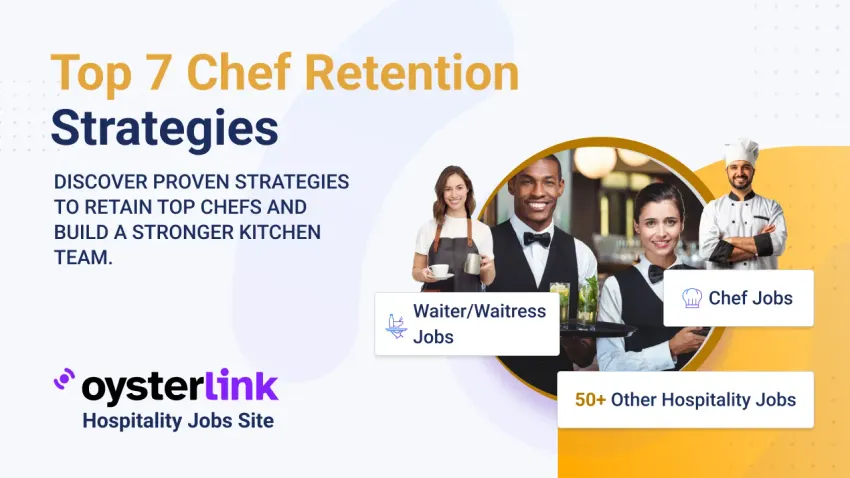This comprehensive guide explores effective Chef retention strategies to keep your kitchen running smoothly and consistently delivering high-quality dishes. Implement these practices to foster loyalty and build a strong, motivated culinary team.
Why Chef Retention Is Essential for Consistency and Growth
Chef retention is essential to a restaurant’s long-term success. Keeping a Chef preserves institutional knowledge, maintains kitchen consistency and fosters a stable work environment.
A committed Chef ensures steady food quality — a key driver of customer loyalty and reputation. Conversely, high turnover disrupts operations, with lost productivity and absences accounting for 58% of total turnover costs.
This underscores the need for proactive retention strategies. Reducing turnover — especially in culinary leadership roles like Head Chef — not only minimizes these costly disruptions but also strengthens team stability and overall kitchen performance.
Impact of Chef Retention on Restaurant Success
Retaining a Chef impacts every part of your restaurant’s performance. A long-term Chef ensures consistent food quality, strengthens your brand and improves team morale.
It also reduces hiring costs and boosts profitability through loyal guests and efficient operations.
Identifying Reasons for Chef Turnover
Before implementing retention strategies, it’s important to understand why Chefs leave. Identifying common causes allows you to address issues early and create a more appealing work environment.
- Burnout: Long hours and high-pressure conditions can quickly lead to exhaustion. Without support or work-life balance, even passionate Chefs may move on.
- Limited growth opportunities: Ambitious Chefs want to develop new skills and take on greater responsibility. If advancement isn’t possible, they’ll seek it elsewhere.
- Inadequate pay: Passion alone isn’t enough. Fair compensation and feeling valued are key to keeping Chefs long term.
- Poor workplace culture: A lack of communication, recognition or a toxic environment can drive away even top-performing Chefs.
7 Key Tips for Chef Retention
From creating a positive kitchen culture to offering growth opportunities and handling challenges effectively, these strategies will help you maintain a strong, committed team.
1. Create a positive kitchen culture
A positive kitchen culture is key to retaining a Chef. Beyond great food, it’s about creating a respectful, supportive environment. Promote open communication and encourage your Chef to share ideas and feedback to build loyalty and trust.
A survey reveals that among the 140 Chef respondents, 70% admitted they experience anxiety, 38% suffer from depression and 49% have sleeping disorders.
Addressing these challenges through regular check-ins and supportive dialogue can make a significant difference.
Recognize and celebrate your Chef’s achievements to reinforce their value and commitment. Simple gestures like “Chef of the Month,” team shout-outs or public praise can boost motivation.
Encouraging collaboration and mentorship also builds leadership and fosters a supportive kitchen environment.
2. Offer competitive compensation and benefits
While not the only factor, competitive compensation plays a significant role in retaining a Chef.
Regularly review and adjust your Chef's salary to ensure it aligns with industry standards and reflects their experience and contributions to your restaurant.
Unsure about the appropriate, competitive salary for different types of Chef roles? Check out OysterLink's collection of salary guides.
Beyond the base salary, consider performance-based bonuses or profit-sharing plans. These incentives can motivate your Chef to continually improve and innovate, knowing their efforts directly impact their earnings.
Benefits packages are equally important. Health insurance, retirement plans and paid time off are standard expectations.
3. Provide opportunities for growth and development
Chefs value growth and development opportunities that enhance their skills and loyalty. Encourage creativity through menu experimentation, competitions, and guest events.
Mentorship and cross-training programs also build leadership, inspire teamwork and prepare Chefs for future career goals.
4. Foster work-life balance
Kitchen work is demanding, and without balance, burnout is inevitable. Supporting your Chef’s well-being starts with fair scheduling and time off.
In this short video, Chef Massimo Capra shares that work-life balance is achievable for Chefs with the right support. His message echoes the need for fair schedules, regular time off and mental health awareness in every kitchen.
Encourage regular rest days, fair shift rotations and full vacations to keep your Chef energized and motivated. Providing mental health support and open communication also helps them manage the stress of a busy kitchen.
5. Invest in kitchen technology and equipment
Supporting your Chef with the right tools and technology shows your commitment to their success and satisfaction.
Modern, reliable equipment streamlines operations and boosts efficiency, while kitchen management software helps simplify tasks like inventory and menu planning.

Finally, adopting sustainable practices demonstrates long-term care for both your team and the environment. Many Chefs value reducing waste and sourcing responsibly.
Supporting green initiatives not only aligns with their passion but also strengthens their connection to your restaurant’s mission.
6. Ensure proper management of conflicts and challenges
Even in the best-run kitchens, conflicts and challenges are inevitable. As a Restaurant Manager or owner, how you handle these situations can make all the difference in retaining your Chef and maintaining a productive, positive environment.
A crucial starting point is establishing clear conflict resolution procedures. Surprisingly, 72% of organizations lack formal policies for resolving workplace conflicts.
A fair, proactive approach to conflict resolution builds trust and a positive kitchen culture. Address issues early, stay open to feedback and offer support during stressful times to strengthen loyalty and teamwork.
7. Conduct effective exit interviews
Even with strong retention efforts, some Chefs will eventually move on. Conduct exit interviews in a relaxed, open setting to gather honest feedback about their experience and reasons for leaving.
Use their insights to improve management practices and strengthen your kitchen culture — and always keep the door open for their possible return.
How To Measure Chef Retention and Team Stability
Tracking Chef retention is crucial to understanding whether your strategies are working.

Start by calculating your annual turnover rate — the percentage of Chefs or key kitchen staff who leave within a year. A lower rate signals strong leadership and a healthy workplace culture.
Beyond turnover, monitor average Chef tenure, employee satisfaction surveys and guest feedback on food consistency.
These indicators reflect how stable and motivated your team truly is. When retention data aligns with high performance and positive guest reviews, it’s a clear sign your kitchen is thriving under strong, sustainable leadership.
Key Takeaways for Chef Retention
Retaining a Chef involves creating a respectful, collaborative workplace, recognizing achievements and offering professional growth.
Competitive compensation, work-life balance and effective conflict resolution further strengthen their commitment, ensuring long-term success for both your Chef and your restaurant.










Loading comments...